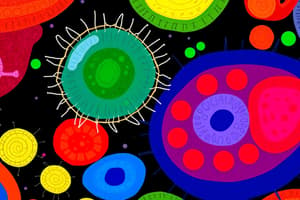Podcast
Questions and Answers
What is the primary focus of cell biology as a branch of biology?
What is the primary focus of cell biology as a branch of biology?
- Study of cellular interactions with the environment
- Study of the organization of cells in different organisms
- Study of the evolution of living organisms
- Study of cell structure and function, cell division, differentiation, and specialization (correct)
Who is credited with the discovery of cells using a microscope?
Who is credited with the discovery of cells using a microscope?
- Louis Pasteur
- Charles Darwin
- Antonie van Leeuwenhoek
- Robert Hooke (correct)
What is the primary characteristic that distinguishes prokaryotic cells from eukaryotic cells?
What is the primary characteristic that distinguishes prokaryotic cells from eukaryotic cells?
- Presence of a nucleus
- Complexity of cellular structure
- Size of the cell
- Absence of membrane-bound organelles (correct)
What is the fundamental unit of life that provides the basis for understanding living organisms?
What is the fundamental unit of life that provides the basis for understanding living organisms?
What is the primary function of compartments in a eukaryotic cell?
What is the primary function of compartments in a eukaryotic cell?
What is the term used to describe the process by which cells become specialized?
What is the term used to describe the process by which cells become specialized?
Which type of cell has a more complex structure?
Which type of cell has a more complex structure?
What is the primary reason why cells are important for understanding living organisms?
What is the primary reason why cells are important for understanding living organisms?
What is the term used to describe the process by which cells divide to form new cells?
What is the term used to describe the process by which cells divide to form new cells?
What is the primary function of the nucleus in a eukaryotic cell?
What is the primary function of the nucleus in a eukaryotic cell?
Flashcards are hidden until you start studying
Study Notes
Cell Biology
Cell biology is a branch of biology that focuses on the study of cell structure and function, cell division, differentiation, and specialization. It is an essential part of biology, as all living organisms are made up of cells, which are the basic unit of life. Cells provide the foundation for understanding the organization of living organisms, their interactions with the environment, and their evolution.
Introduction to Cells
Cells were discovered long ago, but it wasn't until the late 17th century that Robert Hooke used a microscope to observe the internal structure of a cork, revealing the presence of tiny, compartmentalized units that he named "cells" due to their resemblance to the individual rooms of a monk's cell. Since then, the study of cells has evolved significantly, and we now understand that cells are the fundamental unit of life, containing all the necessary components for an organism to function and grow.
Prokaryotic and Eukaryotic Cells
There are two main types of cells: prokaryotic and eukaryotic. Prokaryotic cells, such as those of bacteria, lack a nucleus and other membrane-bound organelles, while eukaryotic cells, like those of plants and animals, have a nucleus and various other membrane-bound organelles. The structure and function of these cells differ significantly, with eukaryotic cells being more complex.
Tour of a Eukaryotic Cell
Eukaryotic cells are divided into several compartments, each with its unique function. These compartments include the nucleus, which contains the cell's genetic material; the cytoplasm, which contains the cell's organelles; and the extracellular matrix, which surrounds the cell and provides support and protection. Some of the key organelles in eukaryotic cells include the endoplasmic reticulum, Golgi bodies, mitochondria, and the cytoskeleton.
In conclusion, cell biology is a crucial aspect of biology, providing insights into the structure and function of cells, which are the building blocks of all living organisms. Understanding cell biology helps us appreciate the complexity of life and the intricate processes that allow cells to function and interact with their environment.
Studying That Suits You
Use AI to generate personalized quizzes and flashcards to suit your learning preferences.




